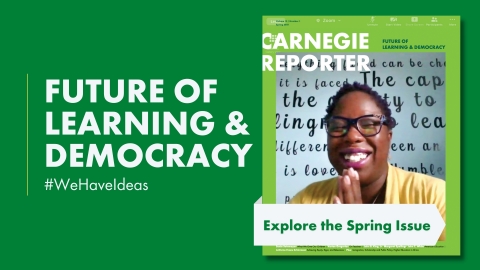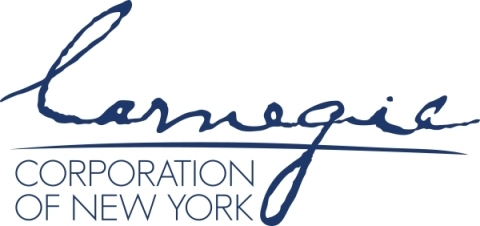Carnegie Reporter Magazine’s Spring 2021 Edition, “Future of Learning and Democracy,” Explores Education’s Role in Fortifying Our Democracy
Carnegie Reporter Magazine’s Spring 2021 Edition, “Future of Learning and Democracy,” Explores Education’s Role in Fortifying Our Democracy
- Former secretaries of education John B. King, Jr., and Margaret Spellings join former Louisiana education superintendent John C. White for a candid discussion on America’s public schools
- Supreme Court Justice Sonia Sotomayor calls for civics education in the classroom
- University of Massachusetts Boston Chancellor Marcelo Suárez-Orozco looks at what drives the immigrant’s faith in higher education
- Vartan Gregorian writes on two of his favorite subjects, teaching and learning, in his final published essay
NEW YORK--(BUSINESS WIRE)--Education is the bedrock of our democracy, ensuring opportunity for all, an engaged citizenry, and a fair and representative government. These foundational ties are explored in the “Future of Learning and Democracy,” the theme of the Spring 2021 edition of Carnegie Reporter magazine, the flagship publication of the philanthropic foundation Carnegie Corporation of New York. The special issue features leading voices in education who identify emerging trends, challenge old assumptions, and provide ideas for an improved educational framework — one that supports lifelong learning and skills development for students and ensures better prospects for all Americans.
The issue is also a tribute to the man who founded the magazine in 2000, Vartan Gregorian, the late president of the Corporation, who died unexpectedly on April 15, 2021, as the magazine was on press. He was deeply involved in shaping the development of the issue’s writings on education and democracy, two themes that shaped Gregorian’s life and work.
“Vartan Gregorian was an immigrant who rose to the highest levels of the humanities, philanthropy, and public service as a U.S. citizen, and through his wisdom and influence, improved the lives of countless individuals around the world,” said Julia Weede, the Corporation’s chief communications and digital strategies officer. “We are proud to honor his legacy through the publication of this edition of the Carnegie Reporter, one that includes Vartan’s last published essay and reflects his priorities, particularly the ties between education and democracy, and their great importance for the strength of our society.”
The “Future of Learning and Democracy” issue includes perspectives from a range of sources, including grantmakers, academics, policymakers, and frontline practitioners who are overcoming countless challenges caused by the pandemic while figuring out what the future of learning should look like.
“The vast societal disruptions of the past year have created opportunities to advance long-needed reforms to strengthen education’s foundational connections to our democracy and economy,” said Kelly Devine, the Corporation’s director of content and publications. “This special issue offers ideas for improving the future of learning and democracy and explores their connections, from the central role of teachers and the need for federal leadership around civil rights, to bipartisan education and alliance building in areas of foreign policy and immigration.”
Among the articles:
Teachers Create the Future of America by Vartan Gregorian. The late president of Carnegie Corporation of New York and past president of Brown University and the New York Public Library pays tribute to the central role of teachers while looking at the demands on the profession, including a lack of support and respect: “A teacher does not merely instill an education, but rather, given adequate supports, provides avenues of discovery that enrich the lives of our children — who are our future citizens.”
What We Owe Our Children by Supreme Court Justice Sonia Sotomayor, who argues that the responsibilities that come with citizenship are learned not inherited. She calls for greater investments in civics education in the classroom, especially hands-on, concrete activities: “A healthy civil society requires peaceful engagement, respectful discussion, and thoughtful action, built on a foundation of knowledge and understanding.”
American Education: What We Absolutely Can and Should Be Doing. John B. King, Jr., and Margaret Spellings, both former U.S. secretaries of education, and John C. White, former state superintendent of schools of Louisiana, discuss the current state and future of education. Their Carnegie Conversation offers wide-ranging perspectives on topics such as the need for stronger federal leadership around civil rights issues, alternatives in postsecondary education, workforce development, and prospects for bipartisan cooperation.
Transforming Education for a Rapidly Changing World by LaVerne Evans Srinivasan, a vice president of Carnegie Corporation of New York and director of the Education program, offers a vision of education that focuses on learning new ways of acting in order to achieve equity, rigor, and relevance. Drawing on the findings of two recent surveys by the Corporation and Gallup, Srinivasan calls for multiple pathways that expose young people to the world of work before they graduate from high school and provide an array of career-related learning opportunities afterward.
Continuing Education for Congress: Building Trust and Expertise — to Get Things Done by writer Menachem Wecker provides a lesson in philanthropy-supported congressional education programs. The aim is to equip members and aides with the information needed to understand complex foreign policy matters and, according to Patricia Moore Nicholas, program officer in the Corporation’s International Program, to “get those bipartisan relationships going.”
Our Future Rests with the Children of Immigrants by Marcelo Suárez-Orozco, chancellor of the University of Massachusetts Boston and a naturalized U.S. citizen. He describes how the economic destruction and job losses of the COVID-19 pandemic will continue a downward momentum in the number of U.S. births, noting that one group is counteracting the downward spiral: the children of immigrants. Chancellor Suárez-Orozco says they are motivated by a strong belief in higher education and predicts, based on historic performance, that they will go on to be overrepresented as engineers, scientists, doctors, and winners of the Nobel Prize.
Additional highlights:
A portfolio of Zoom portraits forms the Reporter’s Center Point, featuring parents, educators, and grantees as they reflect on the importance of family engagement during the pandemic’s unprecedented upheaval; Corporation program director Jim Short calls for a transformation in teaching through the use of high-quality curricula in professional learning; Geri Mannion, the leader of the foundation’s grantmaking in democracy, and program officer Andrew Geraghty see much-needed opportunities for bipartisan progress on immigration; and former Harvard Law School dean and Carnegie Corporation of New York trustee Martha Minow writes about truth, justice, and what mattered most to her mentor, the late Supreme Court justice Ruth Bader Ginsburg.
For more information, visit the online issue of the Carnegie Reporter; subscribe to receive the print version of the magazine; and sign up for the foundation’s newsletters — these resources for informed ideas are always free.
The Reporter has been the flagship “magazine of ideas” for Carnegie Corporation of New York for the past 20 years, assessing emerging trends and urgent challenges and offering ideas to inspire informed action because #WeHaveIdeas. Readers are encouraged to republish or excerpt articles by seeking permission from the foundation.
About Carnegie Corporation of New York.
Carnegie Corporation of New York was established by Andrew Carnegie in 1911 to promote the advancement and diffusion of knowledge and understanding. In keeping with this mission, the Corporation’s work focuses on the issues that Carnegie considered of paramount importance: education, international peace, and a strong democracy. @CarnegieCorp
Contacts
Celeste Ford | Carnegie Corporation of New York | Director of External Relations
Email: CFC@carnegie.org | phone: 646.772.7917

